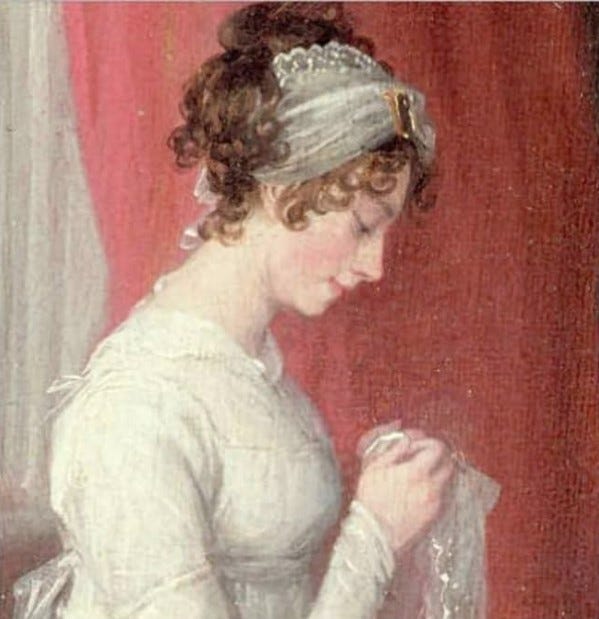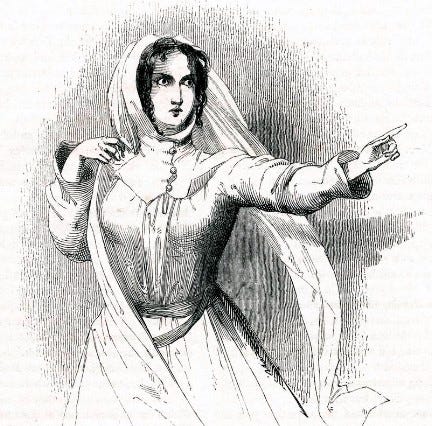Jane Austen is an authoress whose reactionary worldview I have discussed before. This time I want to examine a personal favorite of all her novels, Mansfield Park (1814). It is a story of archetypal femininity, of a girl called Fanny Price, whom feminists most despise. She is demure, religious, sweet, obliging, passive, chaste, submissive, timid, supportive, moral, censorious, quiet, pretty, proper, unassuming.
Out of these materials Austen builds her most fundamentally feminine heroine. In fact Fanny is the ultimate feminine heroine imaginable, with zero masculine tendencies whatsoever. Fanny’s “heroine’s quest” is fulfilled by tenderness, passivity, faithfulness, and tightly upheld propriety. It is women after her fashion that a man would find most pleasing to meet both in fiction and in real life: “Nothing sharp, loud, or coarse – perfectly feminine.”
In the following piece I will examine four particular qualities illustrated in Austen’s novel and depicted in Fanny’s person, and consider their implications in the modern world.
Religion
There occurs a striking conversation concerning religion and priesthood between Edmund, the hero of the novel, and the highly questionable Miss Crawford that he ends up infatuated with.
Miss Crawford: “But why are you to be a clergyman? For what is to be done in the church? Men love to distinguish themselves, and in other lines distinction may be gained, but not in the church. A clergyman is nothing.”
Edmund: “A clergyman cannot be in high state or fashion. But I cannot call that situation nothing, which has the charge of all that is of the first importance to mankind, individually or collectively considered, temporally and eternally – which is the guardianship of religion and morals, and consequently of the manners which result from their influence.”
Piety and religion are a qualities that Fanny shares with Edmund, and ones that she particularly loves in him. The general lesson is that women of baser quality do not and can not appreciate religiousness and piety in a man, nor can that quality be found in their own person. Not so with Fanny, whose character is that of the idea Christian girl.
Fanny has a serious soul that scorns playing with fire and carefully avoids going down any slippery slopes. While Sir Thomas – the father of the family and Fanny’s uncle – is out traveling, a play is secretly being rehearsed by the local young people. Initially Edmund objects to the idea as going against his father’s wishes and is particularly worried about the danger it may pose to the modesty of the girls. Ultimately Miss Crawford and the others are able to tempt and pressure him into accepting the idea and even taking part. The only one of the young people to remain sternly against the project is Fanny.
One of the high points of the novel is when Sir Thomas returns home just as the young people are going through the play on a makeshift stage. The grand, unquestionably virtuous patriarch of the house makes a quick and easy end of the whole endeavour, without any struggle or opposition. It only takes a few calm but decisive words.
This key moment powerfully illustrates two things: Austen’s deep love and admiration for men, and her understanding of the value of patriarchy. The presence of the father represents moral order. His return from abroad is presented as a Return of the King in miniature. Austen is teaching us that this domestic authority is a crucial role only men can fulfill, and that women have good reason to admire and love them for it.
After things return to normal, the other young people still fondly reminisce about the wild and eventful evenings of the past couple of weeks of rehearsals. Fanny comments:
“I suppose I am graver than other people. The evenings now do not appear long to me. I love to hear my uncle talk of the West Indies. I could listen to him for an hour together. It entertains me more than any other things have done – but then I am unlike other people I dare say.”
Modesty
Fanny is a late bloomer. A plain girl in the beginning, she begins to grow quite pretty as the story progresses. But she never loses her modest and demure attitude. In fact, compliments positively shock her:
‘You must begin to harden yourself to the idea of being worth looking at. You must not to mind growing up into a pretty woman.’
‘Oh! Don’t talk so, don’t talk so,’ cried Fanny, distressed by more feelings than she was aware of.
‘Miss Crawford was very right in what she said of you the other day – that you seemed as fearful of notice and praise as other women were of neglect.’
Modesty is an increasingly rare phenomenon nowadays, especially among pretty women. Naturally, for a not-so-pretty woman modesty isn’t as great a virtue, because there’s less power that she’s holding back. When a pretty woman decides to conceal her great charms, she is expressing virtuous restraint. Her charms if openly revealed could be highly beneficial for her in worldly terms, garnering much attraction and attention, and many compliments and opportunities.
Modesty means that a woman is ready and willing to give up such advantages and temptations while at the same time making a virtuous life a little easier for the men around her. Thus, modesty is connected to the triple virtues of temperance, chastity and charity.
Sweetness
Fanny’s supremely feminine qualities are appreciated by many admirers. One such describes her in the following terms:
“The gentleness, modesty and sweetness of her character were warmly expatiated on, that sweetness which makes so essential a part of every woman’s worth in the judgment of a man, that though he sometimes loves where it is not, he can never believe it absent. Her understanding was beyond every suspicion, quick and clear. Her manners were the mirror of her modest and elegant mind.
‘I could so wholly and absolutely confide in her… And that is what I want.”
Sweetness and softness are a qualities that modern education tries its best to stamp out of women, both at home and in society at large. They are seen as something negative and shameful. Instead, a girl is supposed to be sexy, confident, independent, strong, job-oriented, competitive… You will find that most of these are distinctly masculine qualities. We are educating girls to imitate men in all they do, and to do their best to avoid and oppose soft feminine softness. No wonder the sexual polarity has collapsed and men and women can’t match up and find harmony.
Another point illustrated here is the mirrored relationship between thought and behavior. When a woman’s thoughts are sweet and modest, her words and actions will be such as well. This is why reinforcing an authentically sweet and feminine self-image is so crucial. If we leave femininity to be simply a matter of superficial fashion or mimicked behavior learned through peer-pressure, we are inviting trouble. Healthy femininity is engendered in the heart of a woman through encouragement and education.
Thankfully, unlike men, women are creatures whose sexual value is innate, and need only be tended and encouraged to come to bloom, and guarded from misuse. Hence, a girl doesn’t need to earn her femininity or prove herself as a woman. In the depths of her heart and essence she always is feminine, retains the potential, even if unbeknownst to herself.
Propriety
When Fanny hears about a case of infidelity, her reaction is worth recounting:
“The horror of a mind like Fanny’s as it received the conviction of such guilt, and began to take in some part of the misery that must ensue, can hardly be described. At first, it was a sort of stupefaction, but every moment quickening her perception of the horrible evil. If there was a woman of character in existence, who could treat as a trifle this sin of the first magnitude, who could try to gloss it over, and desire to have it unpunished, Fanny could not believe her to be a woman!
There was no possibility of rest. The evening passed, without a pause of misery, the night was totally sleepless. She passed only from feelings of sickness to shudderings of horror, and from hot fits of fever to cold. The event was so shocking, that there were moments even when her heart revolted from it as impossible – when she thought it could not be.”
Propriety is a coin with two sides, both of which are perfectly exemplified by Fanny. In her we witness two fundamentally feminine qualities: tenderness of feeling and the censorious propensity. Both have become either rare or twisted. Modern culture desensitizes women to vulgarity and wickedness and normalizes behavior that would have made traditional women like Fanny utterly distraught (e. g. divorce or extra-marital relations).
The described tenderness is the soft side of propriety. Censoriousness is the hard side, equally central to femininity. Girls and women have an instinctive knowledge of how things are supposed to be. A simple feel for the right ordering of things. This feeling has not disappeared, but now it has been twisted to point at insanity and wickedness. Average women now censor virgins and housewives, and praise loose women and boss girls. The latter types represent the ‘liberated woman’, whereas virtuous womanhood is conceived as repressive and outmoded.
Women at large have lost both elements of propriety, and are now too hardened of heart to be tender in the face of vulgarity and wickedness, and their morals are too off kilter for their censoriousness to be properly ordered.
‘You have some touches of the angel in you’
There is a practical problem that results from encountering authentically sweet and feminine women like Fanny (or Agnes from David Copperfield, or Kitty from Anna Karenina, or Cosette from Les Miserables, or Sophia from Tom Jones, or an untold number of others) in the great literature of our tradition. It raises the bar to heights our social reality cannot meet.
When you become charmed by the virtuous women of our great tradition, it’s difficult not to shake your head when you compare the good that you’ve seen in them with whatever you have to witness in the modern society around you.
Some may try to dismiss this by quipping that the women of the great novels are unrealistic and idealized. But that’s really the point. Once women like they were considered the ideal. Another word for the ideal is the norm. Women like Fanny were normative – normal girls in the highest sense of the word. Of course this does not mean that they constitute a realistic reproduction of the average girl you’d meet randomly on the street in the 18th or 19th century. But it means that the girl you’d randomly meet would have been raised with such an ideal of womanhood as the normative guideline for her femininity.
Girls like Fanny from the works of Austen and similar girls from the books of other virtuous authors exemplified virtuous femininity and did their important part in directing the average girl towards something good, towards a truthful ideal. Culture matters, so do virtuous examples encountered on the pages of great books.
What a person regards as normative and ideal is always of crucial importance. If the normative qualities of good womanhood are propriety, sweetness, modesty, and religion, you will find yourself surrounded by a very different generation of girls than the one we now witness. Today the equivalent norms our culture sets up for girls are likely to be self-will, independence, sexual looseness and secularism. No wonder then that women like Fanny appear unrealistic in our eyes.
In the end, we can’t come close to the ideal we don’t even try. And we certainly won’t find goodness so long as we aim at the wicked and the debased.







